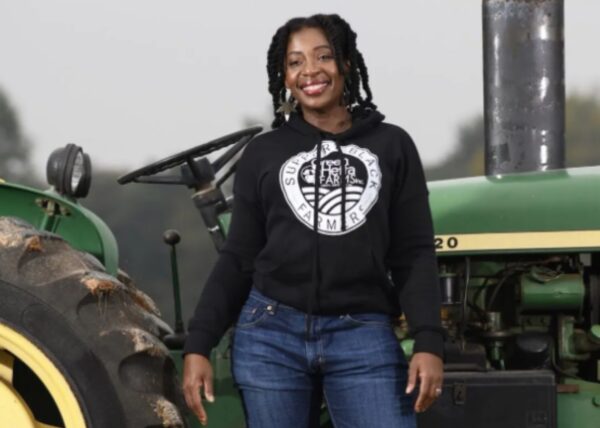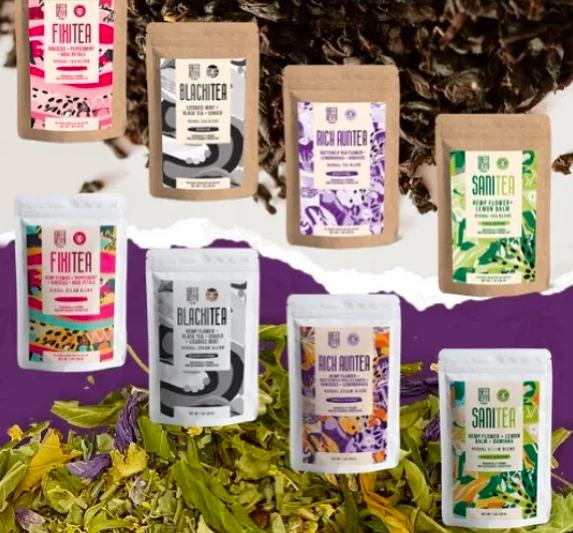Despite facing funding bias and racial discrimination in the farming space, Black women are returning to the industry in different roles. One woman has revamped her life, moving from the non-profit sector to agriculture, as a way to reconnect with the land, as was the case with her ancestors, and participate in U.S. agriculture, food and related industries that contribute on average $1 trillion in U.S. gross domestic product.

Green Heffa Farms’ CEO and president Clarenda Stanley is a descendent of a long line of farmers. She entered the workforce with a white-collar job, opting to sit in front of a computer screen and take meetings over pastoral life. However, in 2018, she “reimagined her legacy” and founded the business, returning to her Alabama agrarian roots, acquiring 14.84 acres in Liberty, North Carolina, and starting a farm where she grows teas for market retail and distribution, an NBC News interview reports.
She grows what her company’s website describes as “organically grown, consciously sown medicinal plants and herbs.” She turns what she grows into teas and tea steams, that she sells online. The range in prices are from $6.99 for a tea sample to $57.99 for a multi-pack.
At first, people thought she was crazy to leave her job to start a farm as a hobby — especially since Black/mixed race people make up about 1.4 percent of farmers in the entire industry compared to the 14 percent 100 years ago. They also make up “less than 0.5 percent of total US farm sales” nationally, operating “at 70 percent of US peer-level farm revenue with a 14 percent operating margin gap versus their peers, before government payments,” according to McKinsey.com.
She remembered, “They thought I’d lost my mind initially, a few of them thought that it was going to be just something cute like a little side hustle or hobby.”
But she quickly changed her mind when her small business started to thrive.
Affectionately called Farmer Cee, over the last four years, she has developed the farm’s philosophy surrounding 4Es: Economic empowerment, Equity, Education and Environment.
Entering the space was important to her so that she can reclaim a space that so many Black and brown people have abandoned in the past or simply have died out, like her grandmother Charity Mae who inspired the business’ name with her quick wit.

“Because of the trauma that’s been inflicted on the Black community, Indigenous community, when it comes to land, a lot of us have lost that connection, and we don’t look to the land for some of the reinforcements that we need for our well-being,” Stanley said.
Stanley not only stands on the shoulders of Charity Mae, but also recently departed Ms. Portia Wilson McClenny, a woman she never met.
McClenny was a Black woman farmer, who also believed in the power of connecting the people with the land, dedicating her life to preserving agrarian culture for the next generation on her farm. Before her transition in 2021, this Virginia native “served on the board of the Chippokes Farm and Forestry Museum, helping with preserving farming culture and tradition,” according to a 2010 House Joint Resolution. She and her husband, Thomas, also “hosted African students for summer farm internships” in the states and shared the value of farming and organic living with the community for a quarter century.
Like McClenny, she said, “I really want it to … look at farming as being reparative, in the sense that it’s reconnecting us to the land and doing it through medicinal plants, which before there were all these pharmaceuticals that’s what we’d use, that’s what we’d turn to.”
Stanley’s presence in the industry will face challenges — some new like the COVID-19 pandemic, which has impacted American farmers substantially, and institutional racism that civil rights leader Fannie Lou Hamer fought against when she founded the Freedom Farmer Cooperative in 1969, and challenged the government and banks on how it viewed and treated Black farmers.
The woman who said she was “sick and tired of being sick and tired” at the 1964 credentials committee of the Democratic National Committee, also purchased “prime land in the Mississippi Delta” at the turning point of Jim Crow “to empower poor Black farmers and sharecroppers who for generations had been at the mercy of white landowners.”
Many of these same challenges continue to exist and have even been roadblocks for Stanley. Banks denied her loans and her work to receive credentialed education in the space was often discouraging.
Still, Farmer Cee is not discouraged and is happy to be among the 13,002 Black women out of the 1.2 million female farmers in the nation, saying, “I help represent a movement of Black women who are returning to the land, by their own commitment to quality of life.”
“I also see our farm as a way to help break the bias with how people look at Black farms,” she continued, understanding her mission will not be deterred.




